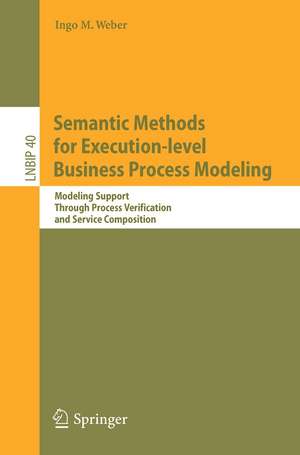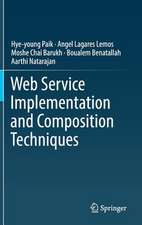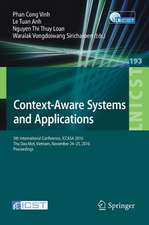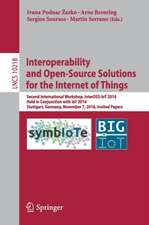Semantic Methods for Execution-level Business Process Modeling: Modeling Support Through Process Verification and Service Composition: Lecture Notes in Business Information Processing, cartea 40
Autor Ingo M. Weberen Limba Engleză Paperback – 6 noi 2009
Din seria Lecture Notes in Business Information Processing
- 20%
 Preț: 327.95 lei
Preț: 327.95 lei - 20%
 Preț: 328.79 lei
Preț: 328.79 lei -
 Preț: 285.94 lei
Preț: 285.94 lei - 20%
 Preț: 415.80 lei
Preț: 415.80 lei -
 Preț: 378.12 lei
Preț: 378.12 lei - 20%
 Preț: 701.97 lei
Preț: 701.97 lei - 20%
 Preț: 580.63 lei
Preț: 580.63 lei -
 Preț: 391.61 lei
Preț: 391.61 lei - 20%
 Preț: 695.32 lei
Preț: 695.32 lei - 20%
 Preț: 323.80 lei
Preț: 323.80 lei - 20%
 Preț: 332.89 lei
Preț: 332.89 lei - 20%
 Preț: 341.15 lei
Preț: 341.15 lei -
 Preț: 392.60 lei
Preț: 392.60 lei -
 Preț: 383.93 lei
Preț: 383.93 lei - 20%
 Preț: 332.89 lei
Preț: 332.89 lei -
 Preț: 381.98 lei
Preț: 381.98 lei -
 Preț: 383.93 lei
Preț: 383.93 lei -
 Preț: 385.62 lei
Preț: 385.62 lei - 20%
 Preț: 328.09 lei
Preț: 328.09 lei -
 Preț: 387.38 lei
Preț: 387.38 lei -
 Preț: 384.86 lei
Preț: 384.86 lei -
 Preț: 377.95 lei
Preț: 377.95 lei -
 Preț: 384.86 lei
Preț: 384.86 lei -
 Preț: 387.75 lei
Preț: 387.75 lei -
 Preț: 379.09 lei
Preț: 379.09 lei -
 Preț: 384.86 lei
Preț: 384.86 lei -
 Preț: 486.42 lei
Preț: 486.42 lei - 20%
 Preț: 411.66 lei
Preț: 411.66 lei -
 Preț: 391.61 lei
Preț: 391.61 lei -
 Preț: 392.37 lei
Preț: 392.37 lei -
 Preț: 483.55 lei
Preț: 483.55 lei - 20%
 Preț: 340.64 lei
Preț: 340.64 lei -
 Preț: 383.93 lei
Preț: 383.93 lei - 20%
 Preț: 346.24 lei
Preț: 346.24 lei -
 Preț: 398.35 lei
Preț: 398.35 lei -
 Preț: 394.51 lei
Preț: 394.51 lei - 20%
 Preț: 330.90 lei
Preț: 330.90 lei -
 Preț: 384.48 lei
Preț: 384.48 lei - 20%
 Preț: 418.27 lei
Preț: 418.27 lei -
 Preț: 486.42 lei
Preț: 486.42 lei -
 Preț: 399.29 lei
Preț: 399.29 lei -
 Preț: 481.58 lei
Preț: 481.58 lei - 20%
 Preț: 338.68 lei
Preț: 338.68 lei -
 Preț: 479.67 lei
Preț: 479.67 lei - 20%
 Preț: 328.79 lei
Preț: 328.79 lei - 20%
 Preț: 352.67 lei
Preț: 352.67 lei -
 Preț: 399.29 lei
Preț: 399.29 lei -
 Preț: 391.61 lei
Preț: 391.61 lei - 20%
 Preț: 419.10 lei
Preț: 419.10 lei
Preț: 333.72 lei
Preț vechi: 417.15 lei
-20% Nou
Puncte Express: 501
Preț estimativ în valută:
63.86€ • 69.35$ • 53.65£
63.86€ • 69.35$ • 53.65£
Carte tipărită la comandă
Livrare economică 22 aprilie-06 mai
Preluare comenzi: 021 569.72.76
Specificații
ISBN-13: 9783642050848
ISBN-10: 3642050840
Pagini: 292
Ilustrații: XII, 292 p.
Dimensiuni: 155 x 235 x 20 mm
Greutate: 0.45 kg
Ediția:2009
Editura: Springer Berlin, Heidelberg
Colecția Springer
Seria Lecture Notes in Business Information Processing
Locul publicării:Berlin, Heidelberg, Germany
ISBN-10: 3642050840
Pagini: 292
Ilustrații: XII, 292 p.
Dimensiuni: 155 x 235 x 20 mm
Greutate: 0.45 kg
Ediția:2009
Editura: Springer Berlin, Heidelberg
Colecția Springer
Seria Lecture Notes in Business Information Processing
Locul publicării:Berlin, Heidelberg, Germany
Public țintă
ResearchCuprins
Foundations.- Background.- Modeling Support through Verification and Composition.- Requirements Analysis and Conceptual Framework.- Verification of Annotated Process Models.- Task Composition.- Finale.- Evaluation.- Conclusions and Outlook.
Textul de pe ultima copertă
Ingo Weber develops new approaches for the rapid development and flexible adaption of business processes, which are often the main requirements in today’s IT support for enterprises. Key issues covered by his work are the automatic composition of processes out of predefined components and the verification of specific process properties. His research aims at quickly creating executable process models, which orchestrate the usage of Web services. He investigates how process modelers can be supported by semantic technologies, e.g., by semantically enriched process models or annotated Web services, and puts special emphasis on expressiveness and scalability.














